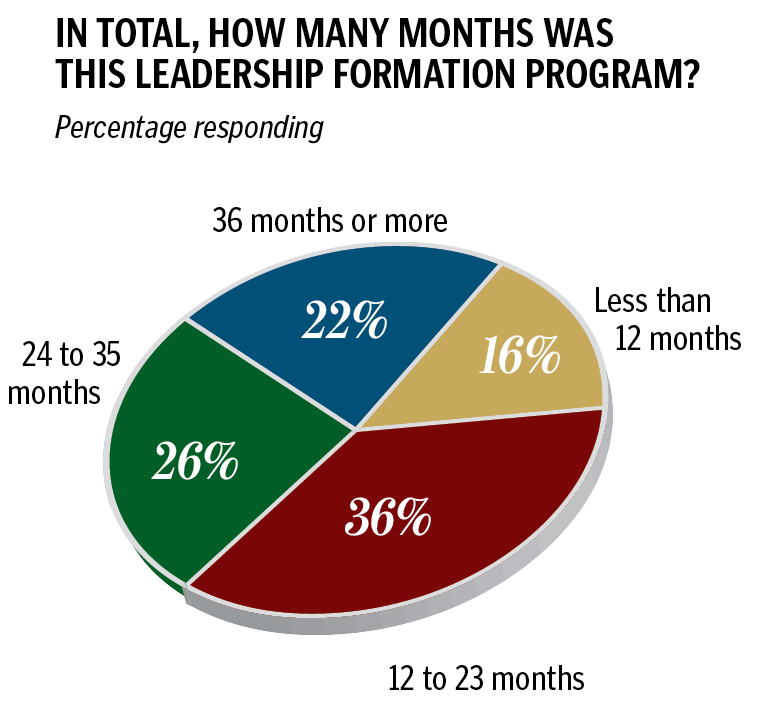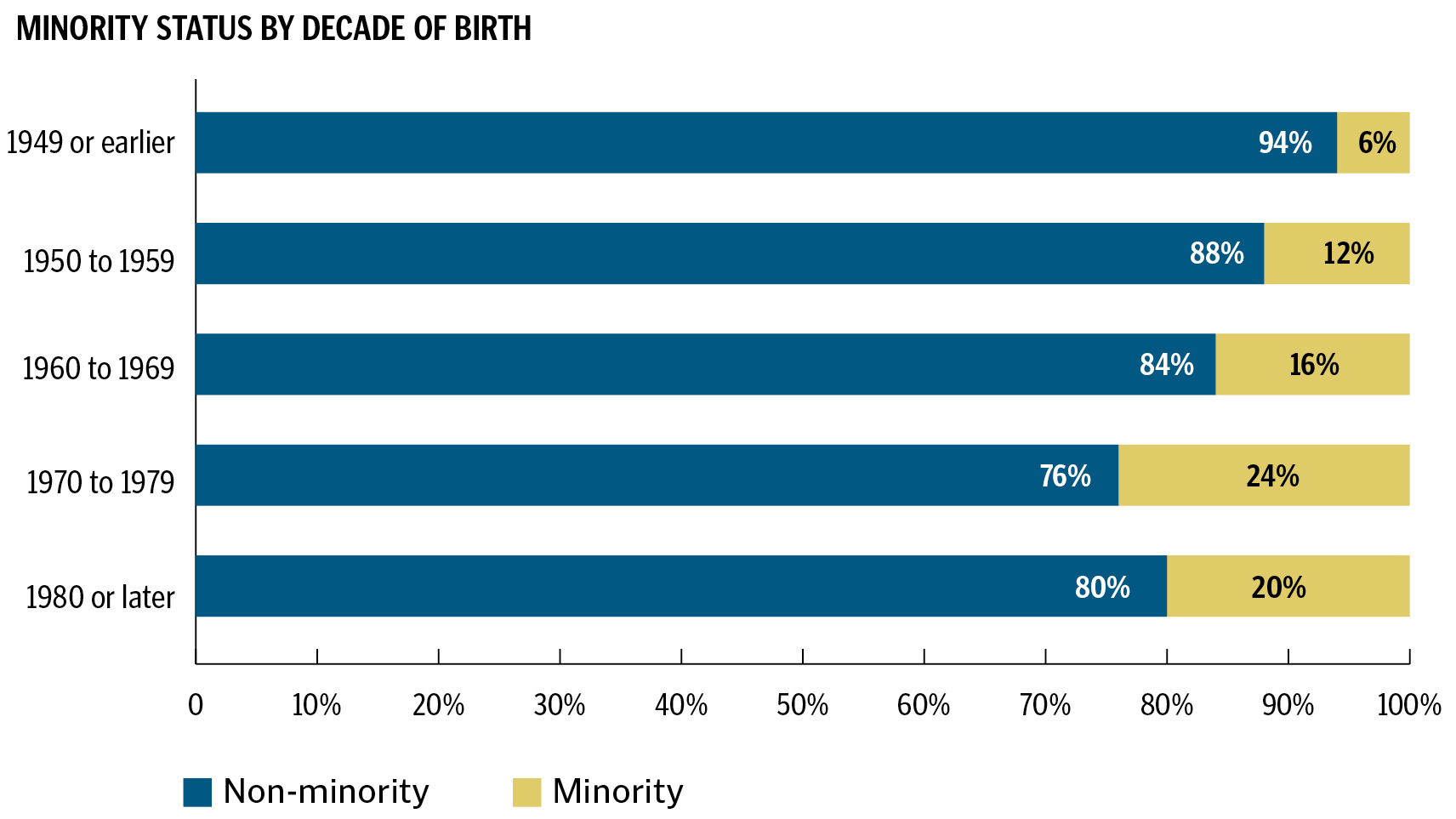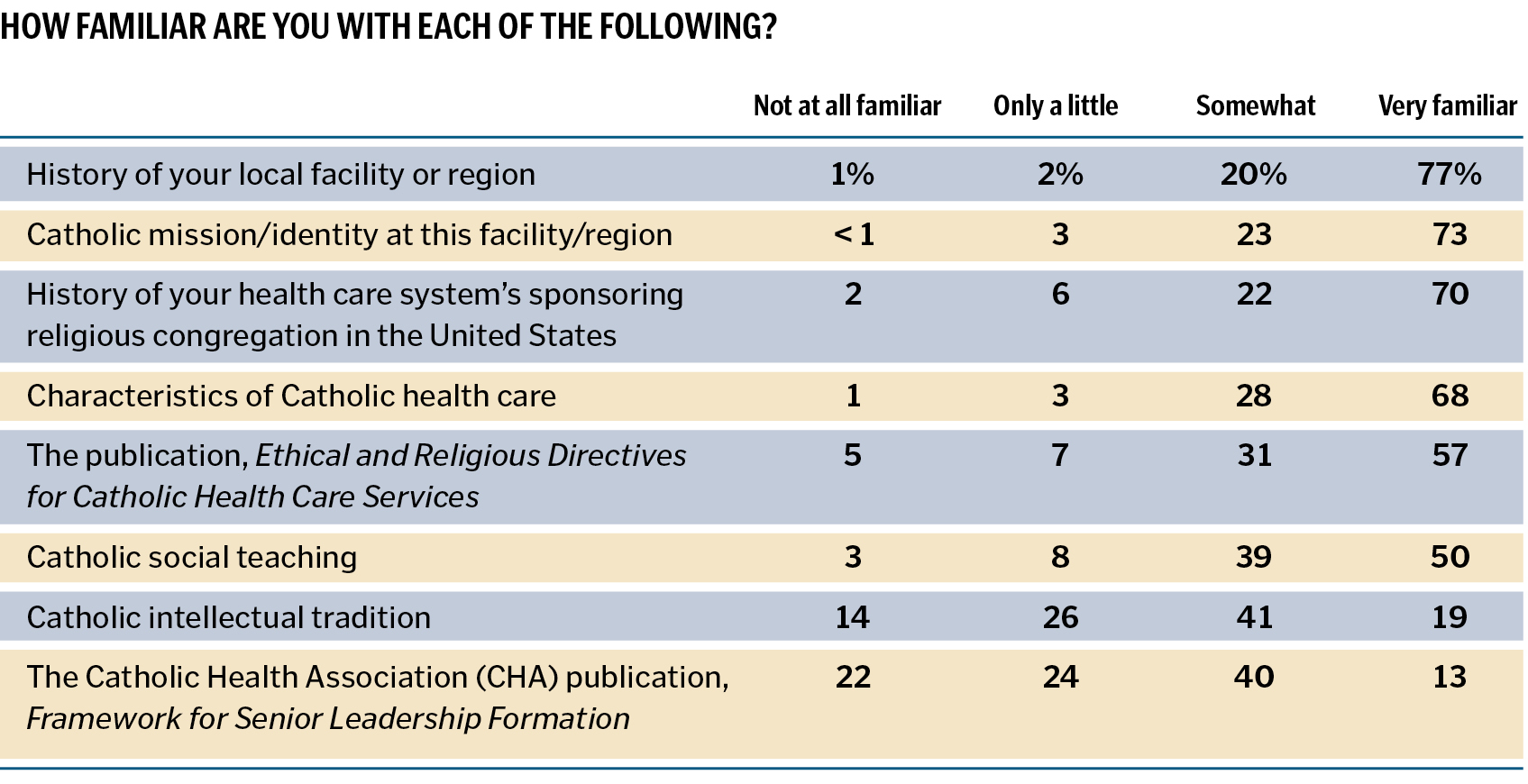BY: BRIAN P. SMITH, MS, MA, MDiv and SR. PATRICIA TALONE, RSM, PhD
During the past 30 years, Catholic health care has transitioned from being led by the women and men of religious congregations to being led by members of the laity. To ensure these lay leaders have the competencies and spirituality necessary to lead this ministry, many Catholic organizations offer senior leadership formation programs. Some have been doing so for more than 15 years.
In 2010, The Catholic Health Ministry — Vision 2020 statement issued by the Catholic Health Association (CHA) called for ministry-wide formation as a prominent and strategic action for its preferred future.
Anticipating the need for measuring formation effectiveness, CHA's ministry leadership formation advisory committee prepared Framework for Senior Leadership Formation, released in 2011 as an assessment tool looking at personal engagement, knowledge transfer and behavioral change.
"Building an effective assessment methodology is a critical next step and one of the logical ramifications of integrating leadership formation and leadership development," the document states. "The ministry at large is increasingly asking to understand the impact of formation on the organization and the mission, along with the development of appropriate investment and return models."
In 2013, CHA conducted the first national survey according to the Framework model of senior leaders who have participated in a leadership formation program. The survey attempted to answer two questions: 1) Are the formation programs being offered to leaders useful to them and applicable to integrating what they learn in their areas of responsibility? 2) Are the dollars and time being spent on executive formation good stewardship?
CHA contracted with the Center for Applied Research in the Apostolate (CARA) at Georgetown University, Washington, D.C., to help design and distribute the survey as well as to analyze the data gathered.
Sr. Carol Keehan, DC, CHA's president and chief executive officer, personally invited approximately 2,100 senior leaders — all of whom had participated in or were currently involved in a ministry formation program — to take the confidential CARA survey. The response rate was 55 percent, with 1,208 senior leaders from 64 Catholic health organizations participating. The margin of error was 1.88 percentage points. CARA noted these participants represented a random sampling drawn from the 64 health organizations, and there were no statistical differences by demographics or professional background among the participants.
The survey covered these areas:
- Background and demographics of senior leaders
- Types of formation programs
- Familiarity with tenets of Catholic health care
- Program content areas
- Qualitative data
The survey also asked participants if the specific content areas were useful or meaningful to their current work, and if the content contributed something new. These questions helped the survey collect information that allows for greater accountability to sponsors and offers opportunities to share best practices across the ministry.
A number of health systems reported that as yet they had no senior formation program or that they offered occasional educational modules but were not following the CHA Framework for Senior Leadership Formation. These tended to be smaller systems or stand-alone facilities, and they cited lack of resources as the primary reason for an approach to formation that was not comprehensive.

DEMOGRAPHICS OF SENIOR LEADERS
- Respondents are highly educated, with 3 in 4 holding a masters' degree or higher
- A third of the respondents acquired at least four years of formal Catholic education
- 88 percent of the respondents are White/Caucasian, though there is more diversity among younger respondents
- The mean age of respondents is 54 years old
- Respondents, on the average, have been in health care more than 20 years. However, compared to their overall years in health care, their average tenure in Catholic health care is 15 years, suggesting a large percentage of respondents did not begin in Catholic health care
- Almost half the respondents self-identify as Roman Catholic
- About 10 percent of the respondents are religious women or men, or priests. On the average, the people in that 10 percent are older than lay men and women respondents
- Of the respondents, 59 percent are senior leaders and 41 percent are middle managers
- Almost half of the respondents work in operations. More women (66 percent) than men (33 percent) work in clinical and mission/spiritual care positions. Finance positions are more likely held by men (66 percent) than by women (33 percent)
TYPES OF FORMATION PROGRAMS
Leadership formation programs are offered in a variety of formats, extend for different lengths of time, are facilitated both in systems and outside of systems and are built around individual, team and cohort models.
- Most formation programs use multi-day modules during the week. The average length of a senior leadership formation program is 23 months. Sixteen percent of respondents attend a program lasting one year or less, and 22 percent attend a program for three years or more.
- Formation programs are facilitated by health systems (64 percent), the health system collaborating with other health systems (25 percent), faculty from a university or academic center (9 percent) or some other delivery method.
- Most formation programs (51 percent) deliver formation using group instruction (team or cohort); individual instruction including spiritual direction, coaching and mentoring (3 percent); and a combination of group and individual instruction (47 percent).
TENETS OF CATHOLIC CARE
The importance of Catholic identity, especially how it is articulated and modeled by leaders in Catholic health care, will grow as new leaders, new partnerships and new regulations revamp the landscape of care. Familiarity and alignment with the principles of Catholic social teaching, with ethical issues as spelled out in the Ethical and
Religious Directives for Catholic Health Care Services and with the mission of the healing ministry are important aspects of Catholic identity.
- Respondents who have completed leadership formation are more likely to be very familiar with the principles of Catholic social teaching and the Directives than respondents who have not begun a formation program.
- Catholic respondents are more likely than other-than-Catholic respondents to be very familiar with the principles of Catholic social teaching and the Directives.
- Only 13 percent of respondents were "very familiar" with CHA's Framework for Senior Leadership Formation, the model on which their formation program was based.

ASSESSING CONTENT EFFECTIVENESS
The 2011 Framework for Senior Leadership Formation identified 10 core content areas for development in a formation program: heritage, tradition and sponsorship; mission and values; vocation; spirituality and theological reflection; Catholic social teaching; ethics; leadership style; holistic health care; diversity; and church relations.
Respondents said the topics that contributed the most to their new learning are: heritage, tradition and sponsorship; Catholic social teaching; leadership style; ethics; and spirituality and theological reflection.
Respondents ranked formation topics according to usefulness and meaningfulness to their current work in this order: Catholic social teaching; leadership style; ethics; heritage, tradition and sponsorship; and spirituality and theological reflection.
For the most part, respondents who received formation through a combination of group and individual instruction, rather than just one or the other, were more likely to rate what they learned as contributing "a great deal" of something new to their learning and "very useful" to their current work. Exceptions to this are in the areas of personal prayer/meditation, spiritual discernment and spiritual direction, where individual instruction is rated higher.
In general, topics of leadership formation have a positive correlation with length of programming; the best assessments of new learning and usefulness to current work are associated with programs that lasted between two and three years. The one exception to this trend is in the area of spirituality and theological reflection. Those who attended shorter programs are more likely than those who attended longer programs to say that learning about areas of spirituality and theological reflection contributed a great deal to their formation. However, the areas of spiritual discernment and spiritual direction show the same positive correlation to length of program.
Data from this part of the survey provides these insights:
- 72 percent of respondents said their prayer life had increased as a result of formation.
- The areas in which Catholic respondents see more usefulness to their work than respondents who are not Catholic are in these topics: stories/charisms/legacy of founder/foundresses; theology of Catholic health care ministry; theological reflection; spiritual reading, praying with Scripture, communal prayer and liturgical prayer; the role of sponsors; and collaboration with the archdiocese or diocese and relationship with the local archbishop or bishop.
- Respondents who attended Catholic schools for four or more years rated several areas as being "very useful" to their current work: ministry of Jesus; stories, charism and legacy of founders or foundresses; theology of Catholic health care ministry; human dignity and stewardship; spirituality and theological reflection; diversity in the workplace; role of sponsorship; human suffering, palliative care and hospice; collaboration with the archdiocese or diocese and relationship with the archbishop or bishop.
- Respondents in mission positions were much more likely to rate topic areas of formation as "very useful" to their current work.
- Respondents in clinical roles rated content areas dealing with human suffering, wellness and prevention higher in the area of "very useful" to their current work.
- Senior leaders rated learning about the Directives "very useful" to their current work more often than did respondents in middle management positions.
- Middle managers, however, rated several areas of formation as "very useful" more often than did senior leaders: holistic care, work/life balance and self-care; human suffering; and wellness and prevention.
- Of those respondents who have not yet attended a leadership formation program, 87 percent expressed interest in attending one in the future. Of that group, 49 percent are "very interested," 38 percent are "somewhat interested" and 12 percent are "only a little interested" in ongoing formation. One percent indicated they were not interested in participating in ongoing formation.

QUALITATIVE DATA
Overall, respondents to the survey reported that, as a result of leadership formation, they are growing in their personal faith and spirituality; gaining a greater understanding of church teaching and information on Catholic health care; and integrating their faith and their work in new and significant ways.
When they are making decisions for their organizations, respondents who have participated in a leadership formation program identified mission and ethical implications as their first concerns, followed by financial and legal issues and then patient safety and service to the community.
Respondents stated the top challenges facing Catholic health care in the next five years are: financial stability; skill gaps and loss of leaders; maintaining mission and Catholic identity; continuing to serve vulnerable populations with declining reimbursements; and the impact of health care reform.
CONCLUSION AND NEXT STEPS
In the last 10 years, many Catholic health systems have begun to offer leadership formation programs to ensure their lay leaders have the competencies and spiritual formation necessary to lead and further this ministry. The ministry also came together in a collaborative effort to share learning and establish a common framework for senior leadership formation.
Respondents to the CARA survey overwhelmingly viewed most of the content being offered in formation as new to their learning and useful to their current work. However, the surveys show there needs to be further research in order to assess the integration of formation.
Leaders said they believe they are integrating their formation into their personal and professional lives, as indicated by what they find they have learned from formation and how they make decisions affecting the organization. Yet this self-reporting is only one kind of measurement.
Objective data from other sources is necessary to validate the conclusion that formation has positively affected the behaviors and decisions of leaders and that the Catholic ministry is flourishing under the leadership of the laity. To ascertain that hope will require multivariate analysis incorporating 360-degree evaluations, mission effectiveness assessments, quality and patient satisfaction scores, employee and physician engagement measures, community needs assessments and evaluations of the impact the ministry's community benefit has on population health.
This more complex evaluation is envisioned in CHA's Framework for Senior Leadership Formation, but it was beyond the scope of the CARA survey.
Also beyond the survey's scope is settling questions of formation and stewardship. In an era of shrinking reimbursement, how will the ministry afford the time and money to fund robust leadership formation programs? In addition to senior leaders, what kind of effective formation can be offered to middle managers and front-line staff?
Each system must determine how to offer formation according to its economic reality; however, not to offer any leadership formation, or just a module now and then, is not being a good steward of the value of the Catholic health care ministry.
The survey showed there are multiple ways formation is being delivered. Not all systems have the resources to develop their own programs, so some are collaborating with other Catholic health systems and universities. Because leadership formation is considered important for other Catholic ministries such as higher education, Catholic social service agencies and diocesan ministries, is there possible collaboration for lay ministry formation programs that might serve a variety of Catholic ministries? This could be especially useful for smaller Catholic systems and stand-alone or rural facilities. Other Catholic ministries already look to Catholic health care's model of formation as a possible framework they can adapt. We have something to offer, and there are partners who want to collaborate.
While this summary report has distilled thousands of pages of data, we recognize that further analysis is necessary to glean the most helpful information. More than once during the data analysis we were cautioned that "data is dangerous," because data can be taken out of context and misused so easily. CHA's Ministry Leadership Formation Advisory Committee will continue to digest the survey results and see if there is any implication for the CHA Framework for Senior Leadership Formation.
In the coming months, CHA will follow up with 20 systems that received individual reports to see if any of their scores in the content areas scored 10 percentage points or higher than the national average. That would be statistically significant, and deeper analysis of how those systems deliver particular content areas might allow other systems to learn even more effective ways of offering aspects of formation. We will report those findings as they become known.
Finally, formation by its nature is ongoing. The completion of a two- or three-year formation program is not the end of the formation process. The survey shows leaders are hungry for formation. A few systems have begun to develop ongoing formation programs for senior leaders, but these programs are generally in a nascent stage.
How to sustain formation with the financial constraints of our day will continue to be a challenge. Yet, if we are to flourish as a healing ministry of the church, we must nurture and nourish the ministers.
BRIAN P. SMITH is senior director of mission integration and leadership formation, the Catholic Health Association, St. Louis.
SR. PATRICIA TALONE, RSM, is vice president, mission services, the Catholic Health Association, St. Louis.
MELISSA A. CIDADE, MA, MARY L. GAUTIER, PhD and EVA S. COLL, are the CARA staff who administered the survey, analyzed the data and prepared the final report.